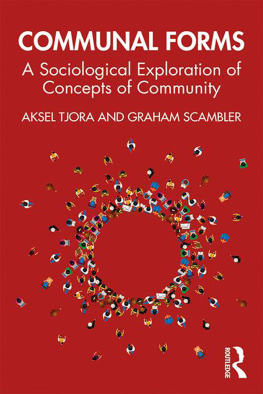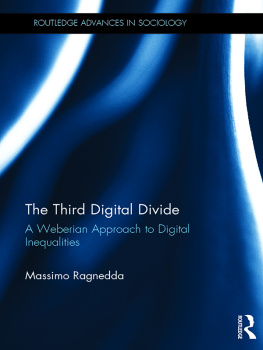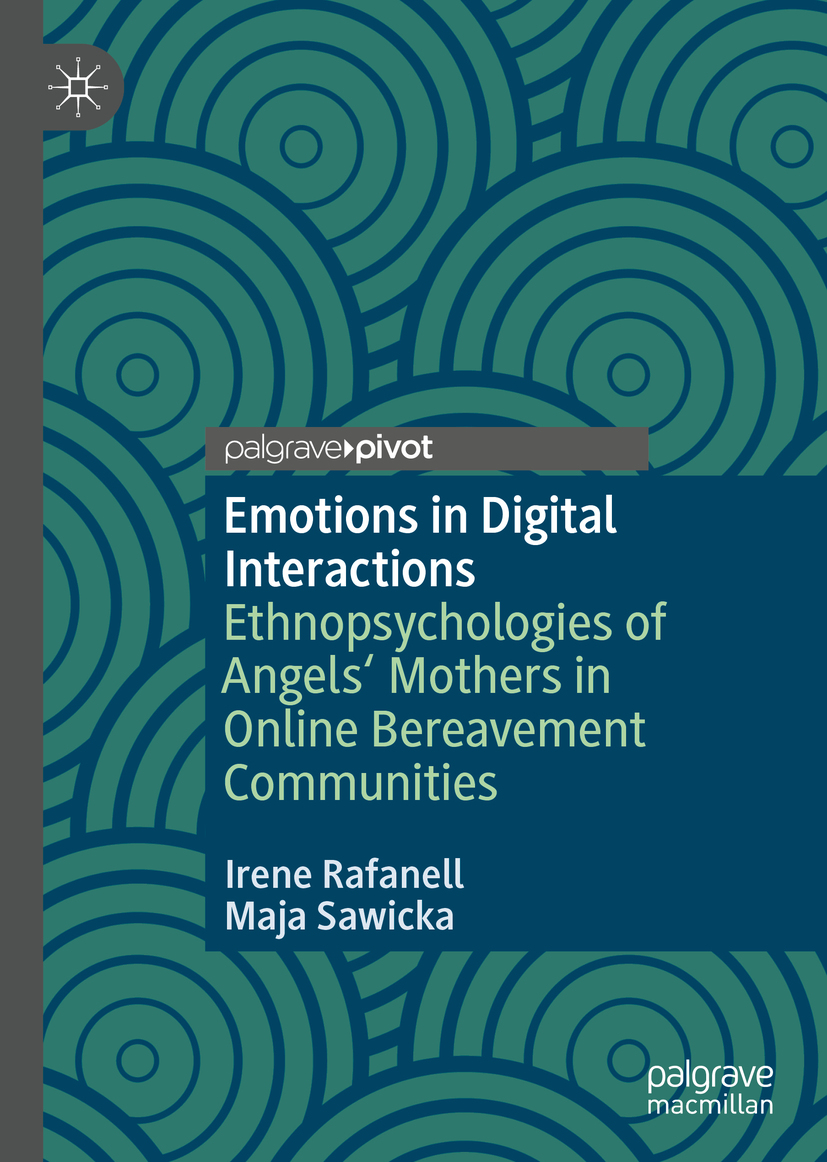Irene Rafanell and Maja Sawicka
Emotions in Digital Interactions Ethnopsychologies of Angels Mothers in Online Bereavement Communities
Irene Rafanell
Division of Social Sciences, University of the West of Scotland, Paisley, UK
Maja Sawicka
Institute of Sociology, University of Warsaw, Warsaw, Poland
ISBN 978-3-030-21997-0 e-ISBN 978-3-030-21998-7
https://doi.org/10.1007/978-3-030-21998-7
The Editor(s) (if applicable) and The Author(s), under exclusive licence to Springer Nature Switzerland AG 2020
This work is subject to copyright. All rights are solely and exclusively licensed by the Publisher, whether the whole or part of the material is concerned, specifically the rights of translation, reprinting, reuse of illustrations, recitation, broadcasting, reproduction on microfilms or in any other physical way, and transmission or information storage and retrieval, electronic adaptation, computer software, or by similar or dissimilar methodology now known or hereafter developed.
The use of general descriptive names, registered names, trademarks, service marks, etc. in this publication does not imply, even in the absence of a specific statement, that such names are exempt from the relevant protective laws and regulations and therefore free for general use.
The publisher, the authors and the editors are safe to assume that the advice and information in this book are believed to be true and accurate at the date of publication. Neither the publisher nor the authors or the editors give a warranty, express or implied, with respect to the material contained herein or for any errors or omissions that may have been made. The publisher remains neutral with regard to jurisdictional claims in published maps and institutional affiliations.
Cover illustration: Pattern John Rawsterne/patternhead.com
This Palgrave Pivot imprint is published by the registered company Springer Nature Switzerland AG
The registered company address is: Gewerbestrasse 11, 6330 Cham, Switzerland
Preface
This book arose from the encounter between the authors, who saw in their collaboration a fruitful way to combine their respective theoretical and empirical work to enhance an understanding of the nature of social reality. This collaboration was underpinned, however, by a person-centered outlook about the life-world of women who have suffered an acute loss. The idea to go into the realities of their online communities was sparked during a conversation of one of the authors with a friend who suffered a perinatal loss. This accidental exchange of thoughts offered a glimpse of a universe of feelings regulated by a unique affective logic obscure for an outsider to this world. This book is an attempt to unravel this logic and translate this universe of suffering to those who might be oblivious to its very existence. In doing so, it attempts to reveal the varied nature and properties of the social world and its contextual grounding. Underpinning this work there are philosophical and ideological considerations aimed to contest, and provide an antidote to, forms of dogmatic essentialism which explicitly or tacitly silence and exclude individuals whose subjective experience, practice, and identity are made to be deviant or abnormal. The authors collaboration emerged from a wish to not only advance academic and theoretical knowledge, but also to highlight the humanizing potential of a social constructionist position which aims to stress the right to being and existence of the marginalized.
This book would not have been written had not been for the bereaved women: courageous in their willingness to openly share the stories of their loss, and compassionate enough to support each other by exchanging their experiences. With this in mind, we would like to thank the anonymous participants of the online communities that we investigated, andespeciallythose few who agreed to become our interviewees. In a sense, the analysis we present here is also for them: it is meant to give voice to their experiences and to reconstruct the internal logic which underlies their actions and feelings. We hope that it accurately depicts their plight and, by highlighting its sociological underpinning, somehow eases it as well.
Needless to say, this project would not have been successfully completed had it not been for the support of many people we met on our way, friends and family. We definitely owe much to Lynn Jamieson, who supported us both throughout the process of writing by unfailing confidence in our work, warmth, and friendship. We are also both indebted to our mentors Mirosawa Marody and Martin Kusch, from whom we learned much about the aims, principles, and worth of sociological analysis. Part of this work was supported financially by the Institute of Sociology of the University of Warsaw (donation no. DSM-107700/16).
During the process of writing this book our personal family environment changed. One son left home to go to his own academic adventures and another was born to populate the nest of another home. We dedicate this book to our children, Samuel and Jerzyk, and our families and friends, whose support and insights were crucial in the process of writing the book.
Irene Rafanell
Maja Sawicka
Paisley, UK Warsaw, Poland
Contents
Part IEmotions, Social Interaction, and Structural Phenomena
Part IIThe Emergence of a New Ethnopsychology of Motherhood
1. Introduction
This introductory chapter outlines the theoretical framework developed, and the empirical investigation undertaken, in order to explore the emergence of a new ethnopsychology of motherhood in online bereavement communities. It adopts a constructionist approach which claims that new reality emerges from the coinage of new linguistic terms to refer to individuals experiences. Key to this position is the claim that linguistic categories emerge as collective goods, i.e. social conventions. Such a claim, in itself, is not novel in the field of the sociology of emotions, which recognizes that emotions are both psycho-physiological and social in nature, and that social factors (including linguistic terms through which individuals identify and name their feelings) participate in the constitution of emotional experiences. However, the authors point out that such approaches perceive emotions as the result of social forces, neglecting their constitutive nature. Emotions not only emerge from social arrangements, but also act as causal forces that bring particular social phenomena into being. A central aim of the book is to identify the methods and mechanisms underpinning the emergence of a new emotional life-world. Such an approach builds upon symbolic interactionist and ethnomethodological tenets, further developing them by incorporating insights from the sociology of knowledge.












